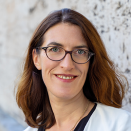Former French foreign minister Hubert Védrine addresses the Franco-German Dialogue for the Future
This is no time for blaming Germany
Looking back over the past quarter century, the former foreign minister noted that the German people and its political leaders had successfully mastered the challenges of reunification. The oft-voiced criticism that Germany has become too politically and economically powerful since 1990 is neither logical nor appropriate, he said.
Quite apart from French attitudes toward German unification – France, unlike its neighbors, has simply not used the past twenty five years to undertake needed reforms and, in particular, to reduce the exploding costs of the public welfare state. At the same time, the current debate over investments is legitimate in the face of today’s economic problems.
A more relaxed take on the role of Germany and France in Europe as a whole
Franco-German cooperation has been key since the end of the Cold War. Today it is needed to develop common approaches to numerous international conflicts. However, the partnership has expanded to encompass a great many other European participants, so that the metaphor of the “Franco-German couple” is no longer current.
During the years of upheaval, despite differences of opinion, diplomats were consistently able to find constructive solutions. One example of this was President François Mitterand’s push for German recognition of the Oder-Neiße border in the face of opposition from the German media and the impending elections of March 1990. Even today, this effort still serves as an exemplary case of open discussion.
Closing the gap between the European Elite and its populations with more subsidiarity
From a personal point of view, Vedrine criticized the approach that envisions the future solely in terms of European Union integration. Citizens’ fears that their national sovereignty is being threatened need to be acknowledged and addressed. For those parties that have mostly been characterized as “euroskeptic” – such as the Alternative für Deutschland (AfD), Front nationale in France, and the UK Independence Party (UKIP) – Vedrine had a stronger term: anti-European. The worrisome growth in popularity of such parties needs to be stemmed. The fact, moreover, that the majority of EU citizens chose not to vote at all in the recent European elections is due to the fact that only the elite calls for more integration. The only possible way to really reach citizens is for the parties to change the way they talk about Europe.
This involves redefining the idea of Europe, whether it be in accepting the nation state, in promoting more subsidiarity (with Brussels performing only those tasks that cannot be performed at a more local level), or in strengthening national parliaments. Vedrine, moreover, warned against the historical error of labeling “nationalist” all those who are not in favor of greater integration.
European Diversity
European partners expect a more robust German engagement, particularly where common European military interventions are concerned – even if diverging interests currently make it impossible to expect a full-blown common security and defense policy (CSDP) and even if Western interventions no longer function as smoothly has they have in the past. In terms of finding answers to the EU’s urgent foreign policy questions, it is not necessarily a matter of pursuing German and French agreement so much as about getting the two EU countries with the most widely diverging positions to seek out a common denominator and find modes of compromising with their partners. In the current debate over sanctions against Russia, for example, Poland and Italy could come together prior to the meeting of EU foreign ministers and the European Council in order to discuss their different opinions and work to find a common position.
Hubert Védrine was French foreign minister between 1997 and 2002 under Prime Minister Lionel Jospin and also served as a member of the French cabinet under President Jacques Chirac. He addressed the Franco-German Future Dialogue on November 6 at the French Embassy in Berlin. The event was organized jointly by the DGAP, the Institut français, and the French Embassy.
